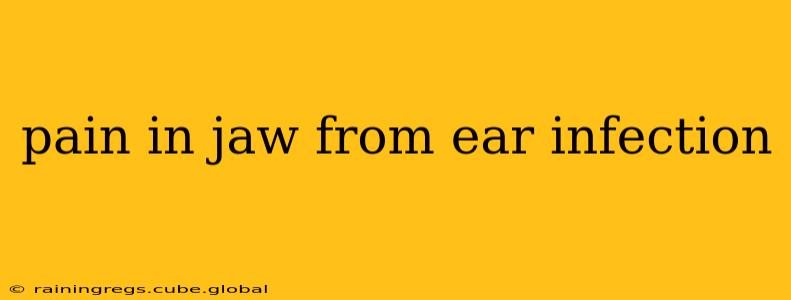Ear infections, while commonly associated with earache, can sometimes cause referred pain in the jaw. This radiating pain can be quite unsettling, leading many to wonder about the connection. This comprehensive guide explores the relationship between ear infections and jaw pain, offering insights into the causes, symptoms, and effective management strategies.
What Causes Jaw Pain from an Ear Infection?
The pain experienced in the jaw from an ear infection isn't directly caused by the infection itself residing in the jaw. Instead, it's a phenomenon known as referred pain. Our nerves are intricately interwoven, and sometimes pain signals from one area can be misinterpreted by the brain as originating from another. In the case of ear infections, the trigeminal nerve, which innervates the jaw, is close to the nerves supplying the middle ear and eardrum. Inflammation and pressure from the ear infection can irritate these nearby nerves, leading to the sensation of pain in the jaw.
How Common is Jaw Pain with an Ear Infection?
While not every ear infection results in jaw pain, it's a relatively common symptom, particularly with more severe infections. The intensity of the jaw pain can vary significantly depending on the severity of the infection and individual sensitivity. Some individuals might experience only mild discomfort, while others may experience more intense, sharp pain.
What Other Symptoms Might Accompany Jaw Pain and an Ear Infection?
Several other symptoms frequently accompany ear infections that manifest as jaw pain. These can include:
- Earache: A persistent ache or sharp pain in the affected ear is a hallmark symptom.
- Hearing loss: Fluid buildup in the middle ear can temporarily impair hearing.
- Fever: A fever is a common indicator of infection.
- Feeling of fullness in the ear: This is due to the fluid buildup behind the eardrum.
- Dizziness or vertigo: In some cases, more severe infections can cause dizziness.
- Pus or drainage from the ear: This is a sign of a more serious infection.
- Headache: The inflammation and pressure can contribute to headaches.
Does Jaw Pain Always Indicate an Ear Infection?
No, jaw pain is not exclusively linked to ear infections. Numerous other conditions can cause jaw pain, including temporomandibular joint (TMJ) disorders, toothaches, sinusitis, and even stress. It's crucial to see a healthcare professional for a proper diagnosis to rule out other potential causes.
How is Jaw Pain from an Ear Infection Diagnosed?
A doctor will typically conduct a thorough physical examination, paying close attention to the ear and jaw. They'll likely use an otoscope to visually inspect the eardrum. In some cases, further investigations like a hearing test or imaging (such as an X-ray or CT scan) may be necessary to rule out other conditions and confirm the diagnosis.
How is Jaw Pain from an Ear Infection Treated?
Treatment usually focuses on addressing the underlying ear infection. This may involve:
- Antibiotics: If the infection is bacterial, antibiotics are typically prescribed.
- Pain relievers: Over-the-counter pain relievers like ibuprofen or acetaminophen can help manage both earache and jaw pain.
- Decongestants: These can help alleviate pressure buildup in the middle ear.
- Ear drops: In some cases, ear drops may be prescribed to combat the infection directly.
When Should I Seek Medical Attention for Jaw Pain and Possible Ear Infection?
Seek immediate medical attention if you experience:
- Severe ear pain: Intense, unbearable pain warrants immediate medical assistance.
- High fever: A high fever indicates a serious infection.
- Pus or drainage from the ear: This is a sign of a potentially serious infection that requires prompt treatment.
- Difficulty hearing: Significant hearing impairment requires prompt medical evaluation.
- Facial paralysis or weakness: This could indicate a more serious complication.
Don't delay seeking professional medical advice if you are concerned about your symptoms. Early diagnosis and treatment are crucial for managing ear infections and preventing complications. Remember, this information is for educational purposes only and does not substitute for professional medical advice. Always consult a healthcare professional for any health concerns.
